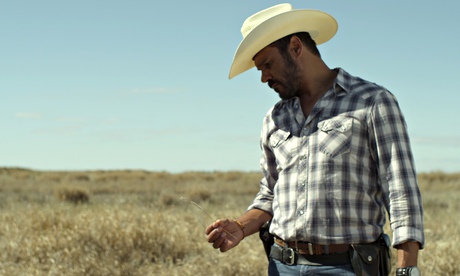
Despite playing out in locations with such evocative names as Massacre Creek, Slaughter Hill and the titular Mystery Road, this atmospheric Australian thriller is closer in tone to the measured, brooding unease of Ray Lawrence's Jindabyne than to the visceral thrills and spills of Greg McLean's Wolf Creek. More interested in unpicking the broiling tensions of outback Queensland than in tying up the loose ends of his straggle-threaded whodunnit plot, writer-director Ivan Sen (who also shoots, scores and edits) goes walkabout through the minefield of contemporary Australian culture, offering an evocative snapshot of an unravelling crime scene – social, racial and economic.
Charismatic Aaron Pedersen stars as detective Jay Swan, returning to his small-town roots after a stint in "the big smoke", which has merely widened the chasm between him and his former peers. The son of a stockman, Jay is "an Abbo copper" caught between two worlds – alienated from his own community, ostracised by his white workmates. "Are you one of them 'black trackers' who turns on his own?" asks a sneering landowner. His family are no more trusting: "At least I know who I am," declares his habitually drunken and battered estranged wife, Mary (Tasma Walton), contemptuous of her former partner's "big house" life on the other side of town, dismissing his concern for the welfare of their teenage daughter as "10 years too late".
It is the discovery of a teenager's body under a road used by truckers that fires this scorched-noir murder mystery. While the police department remains resolutely unmoved by the death of an indigenous Australian girl ("You're on your own on this one, Jay"), the case strikes close to home for the unloved detective – the dead girl had been texting his daughter, Crystal, and his lonely inquiries uncover sordid evidence of drug-dealing, sexual exploitation and worse. You don't have to be a super-sleuth to figure out that Jay is scratching away at a web in which almost everyone is ensnared, or that the thin blue line between cops and criminals has turned a very murky shade of grey. Yet the ultimate destination of the narrative is less important than the road that leads us there, the sights and fellow travellers encountered en route making this a journey worth taking.
Born of indigenous Australian/European parentage, Sen, who made a splash with his 2002 feature debut Beneath Clouds, has consistently explored themes of fractured identity, but here replaces the experimentation of yore with the filtering prism of genre. Both the Stetson and the Winchester rifle that Jay sports nod toward the western template of the lone sheriff cleaning up a hellishly corrupted town, a comparison enhanced by the jutting desert scenery, filmed to resemble some lunar dream of Monument Valley. The recurrent aerial shots of cars following crazy-paved tracks through an incomprehensibly alien landscape suggest an outback version of David Fincher's Zodiac, another culturally inflected murder mystery in which solving the crime was of secondary concern. Meanwhile, eye-catching end-of-the-world locations such as the crumbling Dusk Till Dawn motel evoke the post-apocalyptic world of Mad Max, a world in which "wild dogs" lurk just out of view, their eerie howl lending a backdrop of lycanthropic horror, a spectre of impending catastrophe.
All these disparate threads are firmly rooted in the arid terrain that stretches beyond the edges of the widescreen frame and in the features of supporting players such as celebrated indigenous Australian actor Jack Charles, whose spectacular face tells a thousand stories. As neighbourhood watcher "old boy", the wild-haired Charles bridges the gap between past and present, town and country, providing a rich thumbnail sketch of the strange land that Jay once called home. Hugo Weaving is quietly threatening as Johnno, a line-crossing cop whose "good boy, Jay-boy" mantra drips with significantly canine-inflected racism, but whose true motivations remain unclear. Screen stalwart Tony Barry effortlessly evokes the smilingly sinister stereotypes of which we were recently reminded by the rerelease of the 70s Oz-sploitation classic Wake in Fright.
In the end, though, this is Pedersen's movie, and he excels as the archetypally conflicted antihero, a latterday embodiment of the historical turncoat whose troubled brow seems creased by the weight of both personal and national history. Some of Pedersen's best scenes are wordless (Sen also keeps his musical accompaniment minimal), our eyes drawn toward the taut line of his mouth, the shadow of his eyes, the downward tilt of his head. In one key sequence that speaks volumes about Jay's tortured past, the detective lines up still-filled beer bottles for target practice, notably failing to exorcise his demons, his aim proving as yet untrue.
Significantly, this sequence serves as the set-up for an explosively brash finale which maintains a bracing level of tension despite indulging in the most ludicrous genre tropes. Some may scoff at the descent into mayhem, but as the sound of gunfire fades we are left with a haunting elegy that resonates well beyond the range of mere pulpy cliche.

